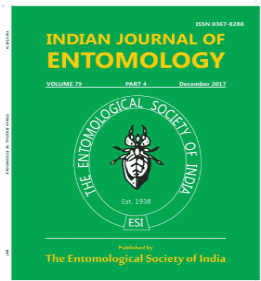Evaluation of Dracaena loureiri Stem and Leaf Extracts for their Larvicidal Activity Against Aedes aegypti
DOI:
https://doi.org/10.55446/IJE.2024.2202Keywords:
Dracaena loureiri, phytochemical, plant extract, ethanolic extract, crude extract, column chromatographic fractionation, mosquito control, insecticide, Aedes aegypti, larvicidal activityAbstract
Insecticides have long been utilized to combat mosquito-borne diseases, but concerns over environmental impact and resistance have prompted exploration of plant-derived alternatives. This study assessed the larvicidal potential of stem and leaf extracts obtained from Dracaena loureiri. Crude ethanolic extracts underwent larvicidal activity testing against Aedes aegypti larvae. The crude leaf extract exhibited significant efficacy, with LC50 values of 309.71 mg/ l (24 h) and 232.58 mg/ l (48 h), whereas the stem extract displayed no activity. Fractionation by column chromatography was performed on the crude extract exhibiting promising activity, followed by a re-evaluation of its efficacy. Two fractions obtained from the leaf extract demonstrated potent larvicidal properties: RC-DT 038 yielded LC50 values of 163.15 mg/ l (24 h) and 138.01 mg/ l (48 h), while RC-DT 040 exhibited LC50 values of 274.25 mg/ l (24 h) and 257.65 mg/ l (48 h). The results suggest the presence of larvicidal bioactive compounds specific to the leaves.
Downloads
Metrics
Downloads
Published
How to Cite
Issue
Section
References
Anupam G, Nandita C, Goutam C. 2012. Plant extracts as potential mosquito larvicides. Indian Journal of Medical Research 135: 581-598.
Benelli G. 2016. Plant-mediated synthesis of nanoparticles: A newer and safer tool against mosquito-borne diseases? Asian Pacific Journal of Tropical Biomedicine 6(4): 353-354.
Chareonviriyaphap T, Bangs M J, Suwonkerd W, Kongmee M, Corbel V, Ngoen-Klan R. 2013. Review of insecticide resistance and behavioral avoidance of vectors of human diseases in Thailand. Parasites and Vectors 6: 280.
Chaudhari A K, Singh V K, Kedia A, Das S, Dubey N K. 2021. Essential oils and their bioactive compounds as eco-friendly novel green pesticides for management of storage insect pests: prospects and retrospects. Environmental Scienceand Pollution Research 28(15): 18918-18940.
El-Halawany A M, El Dine R S, Chung M H, Nishihara T, Hattori M. 2011. Screening for estrogenic and antiestrogenic activities of plants growing in Egypt and Thailand. Phamacognosy Research 3(2): 107-113.
Finney D J. 1971. Probit analysis. Cambridge University Press, London. pp. 68-78.
Gan S J, Leong Y Q, Bin Barhanuddin M F H, Wong S T, Wong S F, Mak J W, Ahmad R B. 2021. Dengue fever and insecticide resistance in Aedes mosquitoes in Southeast Asia: a review. Parasites and Vectors 14(1): 315.
Huang X, Arjsri P, Srisawas K, Yodkeeree S, Dejkriengkraikul P. 2024. Exploring the anticancer potential of traditional Thai medicinal plants: a focus on Dracaena loureiri and its effects on non-small-cell lung cancer. Plants 13: 290.
Kumar P, Shakya R, Kumar V, Kumar D, Chauhan R P S, Singh H. 2023. Chemical constituents and strong larvicidal activity of Solanum xanthocarpum among selected plants extracts against the malaria, filaria, and dengue vectors. Journal of Vector Borne Diseases 60(1): 18-31.
Li Y, Kong D, Fu Y, Sussman M R, Wu H. 2020. The effect of developmental and environmental factors on secondary metabolites in medicinal plants. Plant Physiology and Biochemistry 148: 80-89.
Likhitwitayawuid K, Sawasdee K, Kirtikara K. 2002. Flavonoids and stilbenoids with COX-1 and COX-2 inhibitory activity from Dracaena loureiri. Planta Medica 68(9): 841-843.
Luz T R S A, de Mesquita L S S, Amaral F M M D, Coutinho D F. 2020. Essential oils and their chemical constituents against Aedes aegypti L. (Diptera: Culicidae) larvae. Acta Tropica 212: 105705.
Marin G, Arivoli S, Tennyson S. 2023. Toxicity of Tridax procumbens leaf extract to dengue vectors Aedes aegypti L. and Ae albopictus skuse. Indian Journal of Entomology 85(1): 260-263.
Meksuriyen D, Cordell G A. 1988. Traditional medicinal plants of Thailand, XIII. Flavonoid derivatives from Dracaena loureiri (Agavaceae). Journal of the Science Society of Thailand 14: 3-24.
Piplani M, Bhagwat D P, Singhvi G, Sankaranarayanan M, Balana-Fouce R, Vats T, Chander S. 2019. Plant-based larvicidal agents: an overview from 2000 to 2018. Experimental Parasitology 199: 92-103.
Rutledge L C, Ward R A, Gould D J. 1964. Studies on the feeding response of mosquitoes to nutritive solutions in a new membrane feeder. Mosquito News 24: 407-419.
Silverio M R S, Espindola L S, Lopes N P, Vieira P C. 2020. Plant natural products for the control of Aedes aegypti: the main vector of important arboviruses. Molecules 25: 3484.
Sumitha M K, Kalimuthu M, Senthil M K, Paramasivan R, Kumar A, Gupta B. 2023. Status of insecticide resistance in the dengue vector Aedes aegypti in India: a review. Journal of Vector Borne Diseases 60(2): 116-124.
Thongwat D, Chokchaisiri R, Ganranoo L, Bunchu N. 2018. Larvicidal efficacy of crude and fractionated extracts of Dracaena loureiri Gagnep against Aedes aegypti, Aedes albopictus, Culex quinquefasciatus, and Anopheles minimus mosquito vectors. Asian Pacific Journal of Tropical Biomedicine 8(5): 273-278.
Thongwat D, Lamlertthon S, Pimolsri U, Bunchu N. 2017. Larvicidal activity of endocarp and seed crude extracts of Dracaena loureiri Gagnep against Aedes aegypti (L.) mosquito. Asian Pacific Journal of Tropical Biomedicine 7(3): 222-226.
Thu Z, Myo K K, Aung H T, Armijos C, Vidari G. 2020. Flavonoids and stilbenoids of the genera Dracaena and Sansevieria: structures and bioactivities. Molecules 25: 2608.
WHO. 2005. Guidelines for laboratory and field testing of mosquito larvicides. WHO, Geneva, WHO/CDS/WHOPES/GCDPP/13
Zulfa R, Lo W C, Cheng P C, Martini M, Chuang T W. 2022. Updating the insecticide resistance status of Aedes aegypti and Aedes albopictus in Asia: a systematic review and meta-analysis. Tropical Medicine and Infectious Disease 7: 306.















